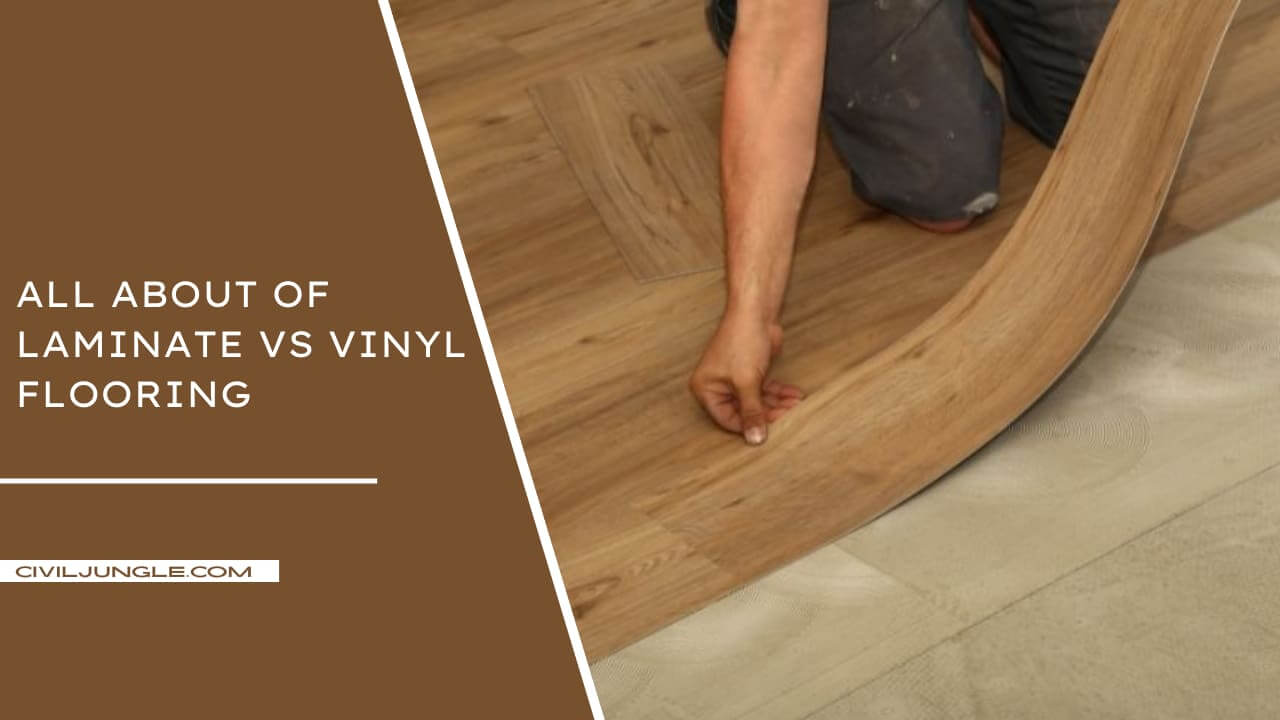
Introduction of Laminate Vs Vinyl Flooring
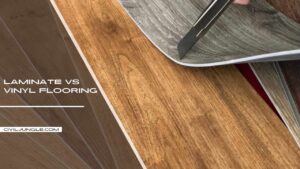
Now in the construction market of flooring two types of flooring are most popular, one is laminate flooring and another one is vinyl flooring.
But these two types of flooring have some common types of advantages like easy self-installation, durability, and provide good economy, and good looks.
But the uses of these two types of flooring depend on the demand and atmosphere, of the installation area, like if the customer demand variety in the flooring then laminate flooring is one of the best flooring material, and on the other hand, if the customer lives in high moisture area then vinyl flooring is one of the best choices and also the vinyl flooring is very easy to clean.
And the most important thing is, at a certain distance these two types of flooring look the same.
Laminate Vs Vinyl Flooring: What
What Is Laminate Flooring?
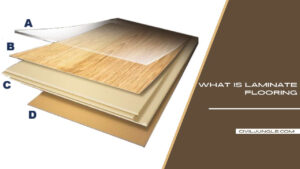
The flooring which is made of synthetic multi-layer with a laminating process is called laminate flooring. Laminate flooring is one type unlike natural flooring, which is composed of four or five layers.
The layers are made of backer papers with some laminate, these layers rest on the below flooring, and the third layer is made of high-density fiberboard, the second part is made of a thin impact resistance layer, and the final or top part is, made of clear wear layer that protects a photographic layer of stone or wood.
What Is Vinyl Flooring?
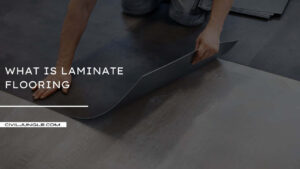
The flooring, which is made of standard four layers of backing, foam, or cork is called vinyl flooring. The bottom or first layer is made of backing and the second layer is a thick core layer and the third layer is a high-resolution photography layer and the top layer is made of a clear wear layer.
The vinyl flooring is also designed as an underlayment material, for this reason, when we install the vinyl flooring we do not lay down any other material prior, which is a very good advantage of vinyl flooring, that helps to maintain the structure cost of the homeowner.
Vinyl vs Laminate: Pros
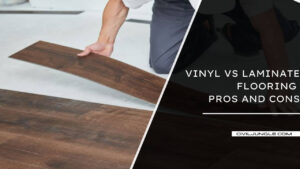
There are have many types pros and cons of laminate flooring, that is below
Pros of Laminate Flooring
Here, the advantages of Laminate Flooring are as follows.
- The pros of laminate flooring are that its synthetic material provides a real hardwood look.
- When customers need variety in flooring then laminate flooring is best for customers, because it provides various types of flooring material compared to other flooring materials.
- The most important reason for choosing laminate flooring is, that underfoot, it provides a pleasing feel.
- Other pros of laminate flooring are when we use it for a long time laminate flooring provides a soft and warm feeling compared to other floorings.
- The pros of laminate flooring are, that it can be easily used in the living room, bedroom, and also entryways of your home.
- Other pros of laminate flooring are that it can be easily installed, and for it, expert workers are not needed, for this by using it we can manage the construction cost of the home.
Pros of Vinyl Flooring
Here, the advantages of Vinyl Flooring are as follows.
- The major pros of the vinyl flooring, in this flooring some vinyl flooring is waterproof like polymer composite vinyl and wood-plastic vinyl is waterproof.
- Another proof of vinyl flooring is that flooring has some important components like wood flour, thermoplastic, and calcium carbonate, which makes it waterproof.
- The common pro of the vinyl flooring is it can be easily installed in high moisture areas.
- In this vinyl flooring, another waterproof variant is present that is made of natural stabilizer, limestone powder, and polyvinyl chloride, and that is called rigid core vinyl.
- Another pro, of vinyl flooring, is that it can be used in very high traffic areas.
- When the vinyl flooring compares to the laminate flooring in moisture resistance then the vinyl goes far better than laminate flooring.
- Other pros of vinyl flooring are that compared to laminate flooring the lifespan and durability of vinyl flooring are far better.
Vinyl vs Laminate: Cons
Cons of Laminate Flooring
Here, the disadvantages of Laminate Flooring are as follows.
- The main con of laminate flooring is that compared to vinyl flooring it doesn’t have a long life.
- After installation sometimes the laminate flooring needs to be replaced within 10 years, which is another con of laminate flooring.
- Another con of the laminate floor is it can not be used in high traffic areas because in high traffic it can be deformed.
- Compared to vinyl flooring materials, laminate flooring materials are less durable, which is another con of laminate flooring.
- Another con of laminate flooring is that if you live in a high moisture area then laminate flooring is not good for your home.
Cons of Vinyl Flooring
Here, the disadvantages of Vinyl Flooring are as follows.
- The major cons of vinyl flooring are that the composition of vinyl flooring is costly, so it increases the total cost of the construction.
- If you choose luxury vinyl flooring then the construction cost goes far away from the laminate flooring.
- It is another cons of vinyl flooring. In the vinyl flooring if the adhesive is used during installation time then it can be difficult to remove the flooring.
- Another con of vinyl flooring is that it is difficult to recycle and is not eco-friendly.
- The con of the vinyl flooring is it can not be repaired if it was broken.
Laminate Vs Vinyl Flooring: Cost
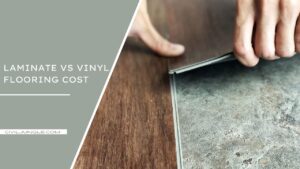
Cost of Laminate Flooring
The cost of the laminate vs vinyl flooring is approximately the same, but there has a little bit of difference that is described below- The cost of a 7 mm thick laminate flooring plank is $1 per square foot and a 12 mm thick laminate plank is $5 per square foot.
Cost of Vinyl Flooring
On the other hand, the cost of the vinyl flooring is $1 per square foot, but if you buy a luxury vinyl flooring then the cost goes to $5 per square foot of thin plank. And for the other prime brands, the cost is more.
Difference Between Vinyl and Laminate Flooring: Waterproof
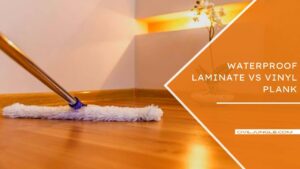
- Most of the laminate flooring is not waterproof, but some of them are water-resistant, on the other hand, all vinyl planks are 100% waterproof.
- The waterproof laminate just soaked the water by resisting the process but the vinyl planks are not soaked in the water, it is just totally waterproof.
- When you want to verify, in flooring then waterproof laminate is best for you because most of the waterproof laminate is made of wood and comes in a variety of colors in plank form, and by interlocking the planks you made a floor, on the other hand, waterproof vinyl flooring comes in planks form or sheet form and it is little more similar to laminate floor.
- Another comparison between waterproof laminate and vinyl plank is when your laminate floor gets wet it tends to extend and after drying the water from the floor it does not get back its original size and makes a deformation, on the other hand, the vinyl floor does not get wet and does not show the above issues.
- There are big differences between waterproof laminate vs vinyl planks in durability and lifespan, whereas the lifespan of a laminate floor is just 10 to 12 years, the lifespan of a vinyl plank is 25 or more years.
- Another difference between waterproof laminate and vinyl plank is if any deep scratch comes on the laminate floor then a few times later it gets deformation and not get repaired, and changes the floor but on a high-quality vinyl floor does not come any stretch and does not deform.
- The waterproof laminate is only used in the low traffic areas, on the other hand, the vinyl plank can be used in high traffic areas.
Vinyl Flooring Vs Laminate Flooring: Basement
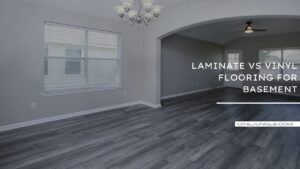
There have major differences between laminate and vinyl flooring for the basement that is below-
- When you go for remodeling your home basement, at first two options come to your mind, one is laminate flooring and another is vinyl plank flooring.
- But for the basement vinyl plank gets more preferably from the laminate flooring, behind this has many reasons.
- One reason is the vinyl floor does not get wet and does not tend to extend but the laminate floor tends to extend and after drying the water from the floor it does not get back its original size and makes a deformation.
- Another reason is the laminate floor can not be used in high traffic basement areas because in high traffic basements it can be deformed but the vinyl flooring can be used in very high traffic basements areas.
- The vinyl plank flooring is more durable than the laminate flooring, which is another reason for choosing the vinyl plank before the laminate floor for the basement.
FAQ: Laminate Vs Vinyl Flooring
What Are the Main Differences Between Laminate and Vinyl Flooring?
Laminate flooring is made of synthetic materials with a photographic layer that mimics wood or stone, whereas vinyl flooring is made from PVC and can come in planks or sheets. Vinyl flooring is generally more water-resistant and durable compared to laminate.
Which Type of Flooring Is More Durable?
Vinyl flooring tends to be more durable and has a longer lifespan compared to laminate flooring, which may need replacement after about 10 to 12 years.
Can Laminate Flooring Be Used in High Moisture Areas?
No, laminate flooring is not suitable for high moisture areas. While some laminate options are water-resistant, they are not entirely waterproof like vinyl flooring.
Is Vinyl Flooring Waterproof?
Yes, most vinyl flooring options are 100% waterproof, making them ideal for areas with high moisture such as bathrooms and basements.
How Does the Installation Process Differ Between Laminate and Vinyl Flooring?
Both laminate and vinyl flooring are relatively easy to install, often featuring click-and-lock systems. However, vinyl flooring does not typically require an underlayment, simplifying the installation process further.
What Is the Cost Difference Between Laminate and Vinyl Flooring?
Both laminate and vinyl flooring start at around $1 per square foot, but prices can increase based on quality and brand. Luxury vinyl flooring can cost up to $5 per square foot, similar to high-end laminate flooring.
Which Type of Flooring Is More Eco-Friendly?
Laminate flooring is generally considered more eco-friendly compared to vinyl flooring, which can be difficult to recycle and is not biodegradable.
Can Either Flooring Be Repaired If Damaged?
Laminate flooring can be challenging to repair if deeply scratched or damaged, often requiring replacement of the affected planks. Vinyl flooring, particularly if it uses adhesive, can also be difficult to repair and may require replacement of sections.
Which Flooring Is Better for High Traffic Areas?
Vinyl flooring is better suited for high traffic areas due to its superior durability and resistance to wear and tear.
What Are the Aesthetic Differences Between Laminate and Vinyl Flooring?
Laminate flooring often offers more variety in design and can mimic the look of natural wood or stone more closely than vinyl. Vinyl flooring, however, also offers a range of designs and is available in both plank and sheet forms.
How Do Laminate and Vinyl Flooring Compare in Terms of Comfort Underfoot?
Laminate flooring typically offers a warmer and softer feel underfoot compared to vinyl flooring, which can be harder and colder, especially in cooler climates.
Which Type of Flooring Is Easier to Clean and Maintain?
Vinyl flooring is generally easier to clean and maintain, especially in areas prone to moisture and spills. Laminate flooring requires more careful maintenance to avoid water damage.
Can Laminate and Vinyl Flooring Be Used in Basements?
Vinyl flooring is often preferred for basements due to its water resistance and durability. Laminate flooring can be used in basements with low moisture levels but is not recommended for areas with high humidity or potential water exposure.
What Is the Lifespan of Laminate Vs. Vinyl Flooring?
Laminate flooring typically lasts around 10 to 12 years, while vinyl flooring can last 25 years or more, depending on the quality and maintenance.
Are There Any Health Concerns Associated with Vinyl Flooring?
Some types of vinyl flooring may emit volatile organic compounds (VOCs) during and after installation, which can impact indoor air quality. It’s important to choose low-VOC vinyl options to minimize this risk.

